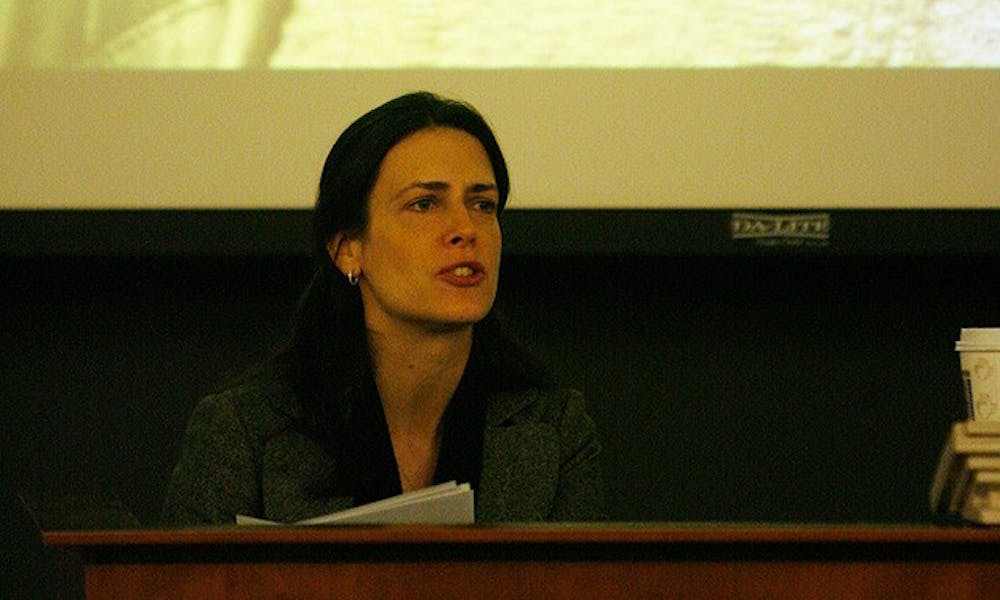American Muslims are facing increasing amounts of public distrust and hate speech, said Andrea Elliott, a Pulitzer Prize-winning investigative reporter for The New York Times.
Elliott gave a lecture titled “Islam in a Post-9/11 America” in the Sanford School of Public Policy Wednesday afternoon to discuss the challenges Muslims face assimilating into American society. She stressed that some Americans are starting to believe that terrorism and Islam are synonymous, even though Muslims have fought for, and even died in the service of, the United States.
“The perpetrators of [the 9/11] attacks were of course not Muslim-American,” she said. “And even though some of their victims were, and even though thousands of American Muslims later served in the U.S. military in Iraq and Afghanistan, this episode left many Muslims feeling they have lost their face in America to... fear and suspicion.”
The event was sponsored by the Duke Islamic Studies Center, the Duke University Middle East Studies Center and the Sanford Institute’s DeWitt Wallace Center for Media and Democracy. After lecturing for nearly an hour, Elliott spent approximately 15 minutes taking questions from students and faculty in attendance.
Although 10 years have passed since the Sept. 11 attacks, Elliott said the amount of anti-Muslim sentiment in the United States has actually increased in the past few years. In August, a poll conducted by the Pew Research Center found that only 30 percent of Americans held a favorable view of Islam. Five years earlier, the statistic was 41 percent. The poll’s results are reflective of recent events, Elliot noted.
“Just last year we’ve seen the fight over the Islamic center near ground zero, the spread of grass-roots opposition to the use of Shariah [Islamic law] and the buildings of mosques elsewhere in the country and the recent congressional hearings focused on Muslims,” Elliott said.
The media has largely been blamed for this resurgence in negative sentiment, with critics asserting that too much of the media’s coverage has focused on terrorism, she said. But people who solely blame the media are ignoring other factors at work such as “the tone set by the Bush administration” and the immediate reaction to the 9/11 attacks, which gave Americans a “frenzied crash course” on the religion, Elliot added.
“[After 9/11], the press was scrambling to make sense of the attacks and a fringe interpretation of Islam [held by the hijackers] was at the center of the story,” she said. “[But] Islam in most of its vast complexity was a subject that most journalists, like most Americans, knew almost nothing about.”
Elliott spent the rest of her lecture discussing what she has learned about Islam from her own work. She described her experience reporting on the life of an imam in New York City—a three-part series called “An Imam in America” for which she won the 2007 Pulitzer Prize—and the forced resignation of Debbie Almontaser. Almontaser was a Muslim who created the Khalil Gibran International Academy, the first English-Arabic public school focusing on the study of Arabic language and culture, only to be accused of radicalizing her students by a recently-formed group called “Stop the Madrassa.” The accusations were baseless, Elliott said, but Almontaser was forced out and replaced by a “Jewish principal who spoke no Arabic.”
Even though Elliott said she believes the United States does not have “a widescale problem with radicalization,” she noted that there have been 50 cases in the last few years in which some American Muslims have been caught plotting terrorist attacks at home and abroad. One of these Americans is Omar Hammami, a young Southern Baptist-raised, Alabaman born to a Muslim and Syrian immigrant father and Christian mother. Hammami became radicalized, however, and is now a leader in the Shabab, an Islamist guerilla army fighting against the current American-backed Somali government.
“[Still], this represents a very miniscule proportion of the U.S. Muslim population,” Elliot said.
Jen’nan Read, associate professor of sociology and global health, was instrumental in inviting Elliot to come speak.
“Often when you follow what’s going on in the Muslim world you hear the same voices again and again,” Read said. “The great thing about Andrea is that she frames things in new and unique ways.”
Sophomore Nicki Adler said she enjoyed the lecture.
“I had read a lot of her articles for our class, ‘Islam and the Media,’ so I was familiar with her,” Adler said. “Every time I see her, I like her more. She is incredibly articulate and has really great advice for anyone that’s interested in journalism.”
Get The Chronicle straight to your inbox
Signup for our weekly newsletter. Cancel at any time.

